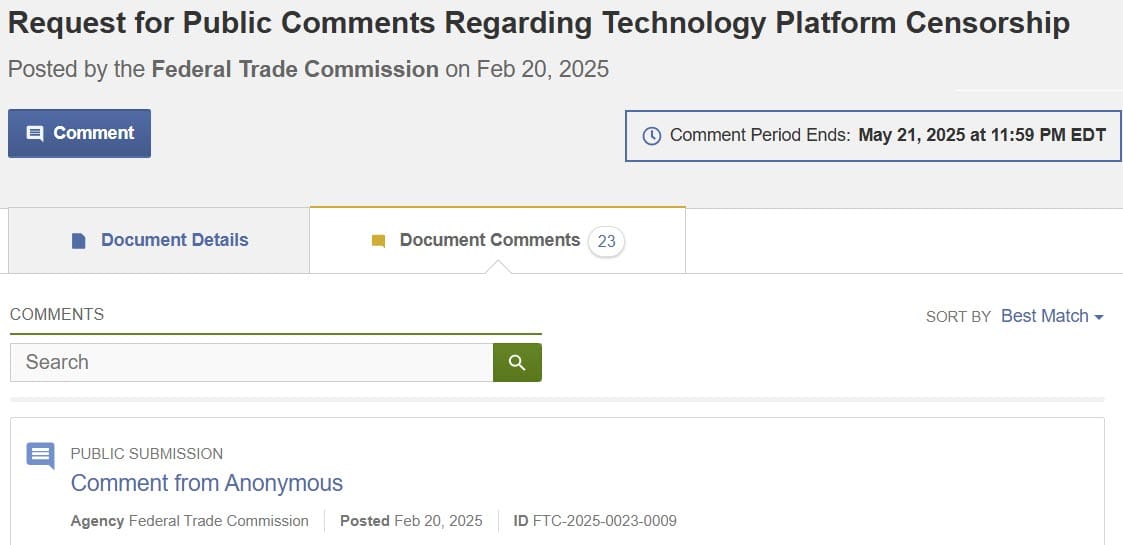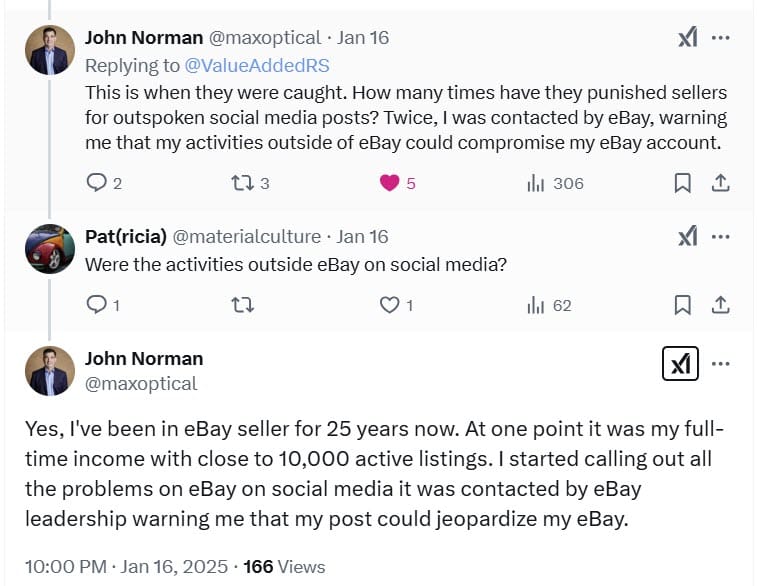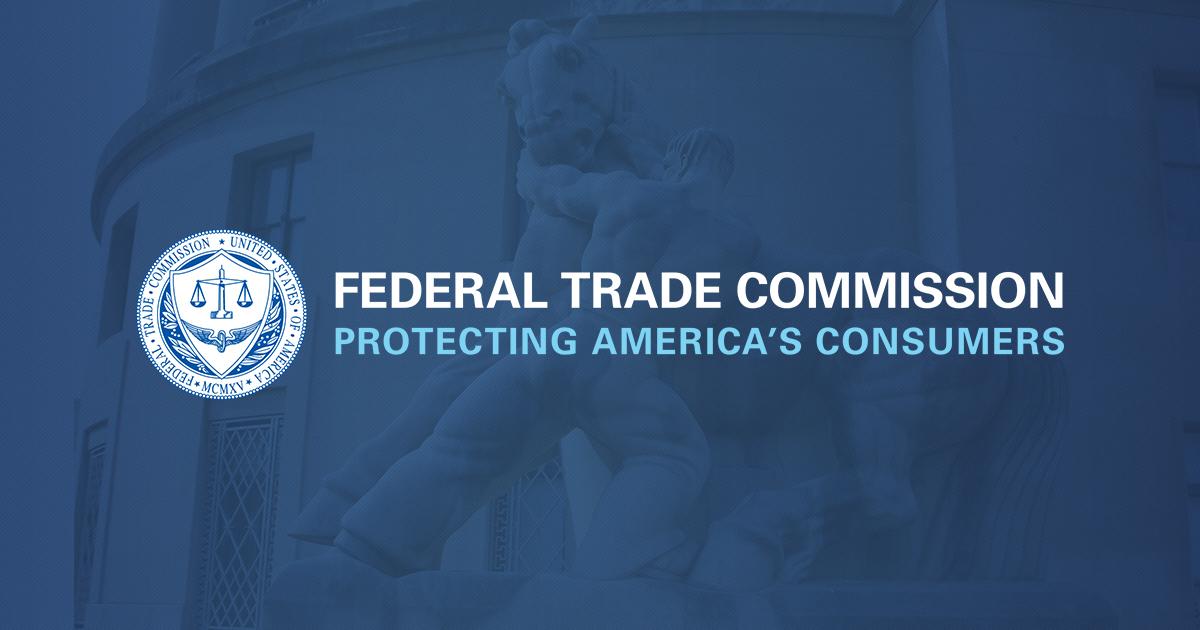FTC Takes On Big Tech Censorship, Banning & Demonetizing With Call For Public Comment
Newly appointed FTC Chairman Andrew Ferguson has come out swinging against Big Tech censorship, shadowbanning, demonetization and more, opening up public comment opportunity for consumers to report how they've been harmed by technology platforms "that limit users' ability to share their ideas or affiliations freely and openly."
Ferguson put out the call for comments both on Twitter/X and in an official press release, saying censorship by technology platforms is not just un-American, it is potentially illegal.
Today, the Federal Trade Commission launched a public inquiry to better understand how technology platforms deny or degrade users’ access to services based on the content of their speech or affiliations, and how this conduct may have violated the law.
Censorship by technology platforms is not just un-American, it is potentially illegal. Tech firms can employ confusing or unpredictable internal procedures that cut users off, sometimes with no ability appeal the decision.
Such actions taken by tech platforms may harm consumers, affect competition, may have resulted from a lack of competition, or may have been the product of anti-competitive conduct.
The FTC issued a Request for Information (RFI) requesting public comment on how consumers may have been harmed by technology platforms that limited their ability to share ideas or affiliations freely and openly.
“Tech firms should not be bullying their users,” said FTC Chairman Andrew N. Ferguson. “This inquiry will help the FTC better understand how these firms may have violated the law by silencing and intimidating Americans for speaking their minds.”
Tech platform users who have been banned, shadow banned, demonetized, or otherwise censored are encouraged to share their comments in response to the RFI.
The FTC is interested in understanding how consumers—including by potentially unfair or deceptive acts or practices, or potentially unfair methods of competition—have been harmed by the policies of tech firms.
The RFI provides more detail about what the FTC is looking for - and while much of it is clearly aimed at social media platforms in particular, there's no question that the experiences of both buyers and sellers on major ecommerce marketplaces would also fit within the definition "technology platforms" as other internet services:
Technology platforms may include, among others, companies that provide social media, video sharing, photo sharing, ride sharing, event planning, internal or external communications, or other internet services.
The comment form will allow attaching pictures and document, so the more detail provided the better, and importantly, consumers can choose to submit reports anonymously if they so choose.

FTC staff encourages members of the public, including current and former employees of technology platforms, to comment on any issues or concerns that are relevant to the FTC’s consideration of this topic
It's worth reading the full list of questions the FTC has posed, but here are a few that might be of particular interest to online sellers who may have experienced account restrictions/shutdowns, shadowing banning, or other adverse actions taken by marketplace platforms like Amazon, Walmart, Facebook, eBay, Etsy and more:
Under what circumstances have platforms denied or degraded (“shadow banned,” “demonetized,” etc.) users’ access to services based on the content of the users’ speech or affiliations?
- What specific adverse actions did the platform take?
- Did the platform take such adverse actions in response to its users’ speech or actions on the platform?
- Did the platform take such adverse actions in response to users’ off-platform activities?
Did the platform represent, implicitly or explicitly, whether users had the ability to challenge or appeal adverse actions that deny or degrade the affected users’ access to services?
- Did the platform offer a meaningful opportunity to challenge or appeal adverse actions that deny, or degrade users’ access, consistent with its users’ reasonable expectations based on its representations?
- How long did the platform take to adjudicate such challenges or appeals?
- Has the platform applied a consistent challenge or appeals process in response to analogous conduct by different users?
It's important to note the FTC is asking for examples of adverse actions taken due to both on platform and off platform activity - so if, for example, a marketplace took or threatened to take negative action against you or your account based on your off platform social media posts, that would absolutely be something they would want to know about!

eBay sellers in particular have alleged this kind of activity for years, but many have been afraid to go public with their stories - especially after it became known that eBay security personnel threatened, stalked and harassed journalists Ina and David Steiner of EcommerceBytes in 2019 in an effort to influence their reporting and unmask the identity of Fidomaster/ @unsuckEBAY, an anonymous Twitter user and source who also sparked the ire of top executives at the company.
But beyond such direct and obvious threats, marketplace policies can act in many subtle ways to restrict or repress speech and expression - for example, last year Etsy updated their prohibited items policies in a way that was clearly meant to target political activism and give the platform wider latitude to remove items it deemed "violent, degrading or hateful."
It was noteworthy that in an election year where immigration policy was a hot button issue, Etsy added "immigration status" to the list of protected classes in that policy and prohibited "content which directly or indirectly contains violent or degrading commentary against protected classes" - with Etsy of course being the sole arbiter of what might be considered violent or degrading commentary.
Etsy also removed "political affiliations" from the list of kinds of people whom they want to feel welcome on the site, indicating that merchandise which Etsy deems to be politically divisive may be more likely to be taken down.
Anyone who believes they have been adversely impacted by those changes to Etsy's policies absolutely can and should provide commentary to the FTC as part of this request for information too.
However, the adverse actions don't need to be specifically related to political topics or positions - the FTC makes it clear they are interested in actions taken by tech platforms which deny or degrade users’ access to services based on the content of speech or affiliations which could cover a broad spectrum of issues outside the political realm.
Comments must be received no later than May 21, 2025 by 11:59pm ET - here's what you can do to make your voice heard:
- Go to the docket on regulations.gov
- Click “Browse Documents”
- Underneath the document containing the RFI questions, click comment (the blue button)
- Fill out the form which requires both the comment text and comment category.
- You can submit as: an individual, an organization, or anonymous and have the option to add attachments to aid your response.
DO NOT include sensitive or confidential information like social security numbers, dates of birth, ID numbers, or other sensitive data in the comments.
The FTC will post comments publicly online and may also use them inform the Commission's enforcement priorities and future actions.
Bonus: If you submit a public comment to the FTC on this topic, Value Added Resource would love to hear about it!
Feel free to copy and paste your FTC comments in the VAR comment section below or submit them via email, Twitter/X, Facebook, LinkedIn, or Signal - requests for anonymity will absolutely be respected and your comments may be featured in future Value Added Resource reporting.
























Since I'm really a private seller, meaning I sell very little (I'm not a store that sells privately to avoid taxes), I go to the post office two or three times a week with a few items and ask for Proof of Postage. If Royal Mail loses or breaks an item, I file a claim. So far, Royal Mail has paid every claim I've filed, previously with a bank check and, for some time now, with stamps. When they pay me with stamps, they send me roughly double the value of the loss in stamps. If I sold something for 5 or 6 pounds, they send me eight first-class letter stamps, about £12.80. I use those stamps for second-class large letters (£1.55). I add a note next to the stamp explaining that the stamp covers the value of second-class large letters. And I've never had any problems.
Now everything will be more expensive for the buyer, I'll have to leave eBay.
Can anyone advise me on where to sell online in the UK, and where it'll be effective? Another option is to sell my things as job lots, at very low prices to clear my stock.
I'm sure "Simple" will raise shipping costs for buyers, effectively driving private sellers out of the market with noncompetitive prices. Another problem is that I live in a village and there's only a post office. I won't spend a drop of petrol shipping packages miles away because the buyer chooses another shipping company. And if the option is for the buyer to pay even more to have someone pick up what I sold from my house, it will be impossible to sell. And add to that, having to wait for someone who will come to pick up the package whenever they want. Or will I leave it lying outside the door? Because now the custom is for the delivery person to leave everything lying right outside your door. They don't even ring the bell anymore. And if you're lucky, it's your door and not someone's in another town.